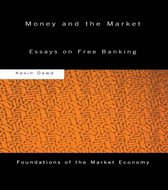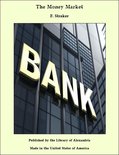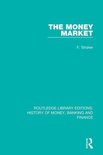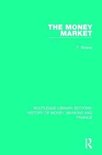The Money Market Ebook Tooltip Ebooks kunnen worden gelezen op uw computer en op daarvoor geschikte e-readers.
Afbeeldingen
Sla de afbeeldingen overArtikel vergelijken
Samenvatting
The present position of the Money Market in this country so enters into the life of the people as a thing that is, that few trouble themselves to inquire how our monetary system came to be what it is, how it was founded, grew, and developed into its present state. Whether people are aware of it or not, the stability and condition of the Money Market of a country influences the lives of all—rich and poor alike—and the material well-being of all is largely dependent upon it. Before proceeding to any examination of the methods in which present-day business in the London Money Market is conducted, we will look back into the past, and trace the rise of our financial system from its early beginnings. Trade is, of course, the foundation of, and reason for, the need of money; and trade commenced with the first division of labour. With the earliest men one was more fitted for one thing and one for another; one was a hunter and one a husbandman. When the hunter handed over to the husbandman so many skins for so much corn, trade was established; but this trade was, of course, only a system of barter. As men grew more civilised and trade developed, the inconveniences of this system became apparent and pressing, and gradually more suitable modes of settling transactions were evolved; although in certain remote and uncivilised parts of the world trading by barter exists to the present day. As a reminder of bygone times there is, in the Royal Exchange, a picture of the Phœnicians trading with the men of Cornwall fine cloth for tin and skins. We know that the early inhabitants of this country had coinage of a kind, but the earliest record of any definite business in monetary transactions was in the reign of William the Conqueror, who first introduced Jewish traders to this country. From that time on, for hundreds of years, the Jews were more or less intimately connected with our finances; but they led a very chequered career in England, being frequently treated with great cruelty and barbarity. They were required for the help which could be obtained from them, but hated by the people for their usurious practices. The exactions which the kings and nobles of the time put upon them were largely conducive to these practices, however, as unless the Jews could make large profits out of the people they would not have been able to meet these exactions. The financial importance of the Jews appears to have declined in this country towards the end of the thirteenth century; but about the same time their place was taken by the Lombards, the early Italian merchants, who came over and settled here in the street which still bears their name. These Lombards were men of some attainment, being skilled in arts and trade, and they possessed the only knowledge of banking then in existence. They combined the art of the goldsmith with the business of the banker, and gradually obtained a firm and sound footing in the country. The reign of Elizabeth was notable, among many other things, for a great and important increase in the trade and commerce of the country. Many causes contributed to this, among others being the capture of Antwerp by the Duke of Parma, when it is said a third of the merchants of that flourishing city found a refuge on the banks of the Thames. The newly awakened national energies found fresh outlets and markets, and London gradually became the general mart of Europe and of the then known world. That the knowledge of banking and the foreign exchanges had by this time considerably developed we can gather from many sources; but the knowledge and wisdom exhibited by Sir Thomas Gresham during the reigns of Edward VI., Mary, and Elizabeth is remarkable, and his influence had a far-reaching effect on the public and private finances of the time.
Productspecificaties
Inhoud
- Taal
- en
- Bindwijze
- E-book
- Oorspronkelijke releasedatum
- 16 maart 2020
- Ebook Formaat
- Adobe ePub
- Illustraties
- Nee
Betrokkenen
- Hoofdauteur
- F. Straker
- Hoofduitgeverij
- Library Of Alexandria
Lees mogelijkheden
- Lees dit ebook op
- Android (smartphone en tablet) | Kobo e-reader | Desktop (Mac en Windows) | iOS (smartphone en tablet) | Windows (smartphone en tablet)
Overige kenmerken
- Studieboek
- Nee
EAN
- EAN
- 9781465640727
Je vindt dit artikel in
- Categorieën
- Taal
- Engels
- Beschikbaarheid
- Leverbaar
- Beschikbaar in Kobo Plus
- Beschikbaar in Kobo Plus
- Boek, ebook of luisterboek?
- Ebook
Waarom een wereldbollabel?
Artikelen met een wereldbol bezitten positieve eigenschappen vergeleken met soortgelijke artikelen, zoals bepaalde keur- of kenmerken op sociaal en ecologisch gebied.
Keur- of kenmerken
-
Digitaal boek
Onafhankelijk onderzoek toont aan dat als je meer dan 25 ebooks downloadt, dit een lagere milieuimpact heeft dan van fysieke boeken.
Kies gewenste uitvoering
Prijsinformatie en bestellen
De prijs van dit product is 4 euro en 99 cent.- E-book is direct beschikbaar na aankoop
- E-books lezen is voordelig
- Dag en nacht klantenservice
- Veilig betalen
Alle bindwijzen en edities (4)
-
4,99Direct beschikbaar
-
38,99Direct beschikbaar
-
46,992 - 3 weken
Levertijd
We doen er alles aan om dit artikel op tijd te bezorgen. Het is echter in een enkel geval mogelijk dat door omstandigheden de bezorging vertraagd is.
Bezorgopties
We bieden verschillende opties aan voor het bezorgen of ophalen van je bestelling. Welke opties voor jouw bestelling beschikbaar zijn, zie je bij het afronden van de bestelling.
Tooltip -
114,993 - 4 weken
Levertijd
We doen er alles aan om dit artikel op tijd te bezorgen. Het is echter in een enkel geval mogelijk dat door omstandigheden de bezorging vertraagd is.
Bezorgopties
We bieden verschillende opties aan voor het bezorgen of ophalen van je bestelling. Welke opties voor jouw bestelling beschikbaar zijn, zie je bij het afronden van de bestelling.
Tooltip
Rapporteer dit artikel
Je wilt melding doen van illegale inhoud over dit artikel:
- Ik wil melding doen als klant
- Ik wil melding doen als autoriteit of trusted flagger
- Ik wil melding doen als partner
- Ik wil melding doen als merkhouder
Geen klant, autoriteit, trusted flagger, merkhouder of partner? Gebruik dan onderstaande link om melding te doen.












